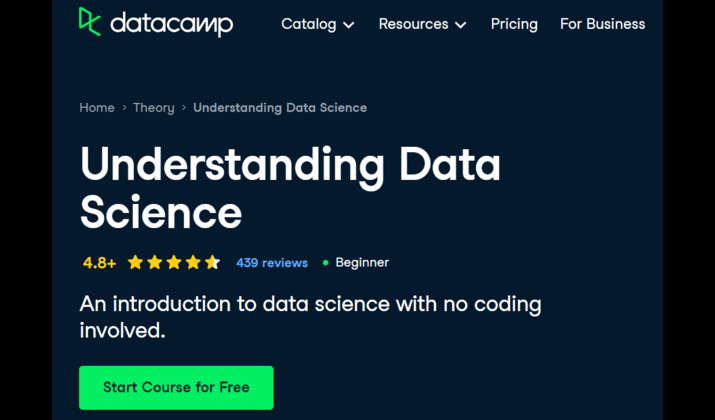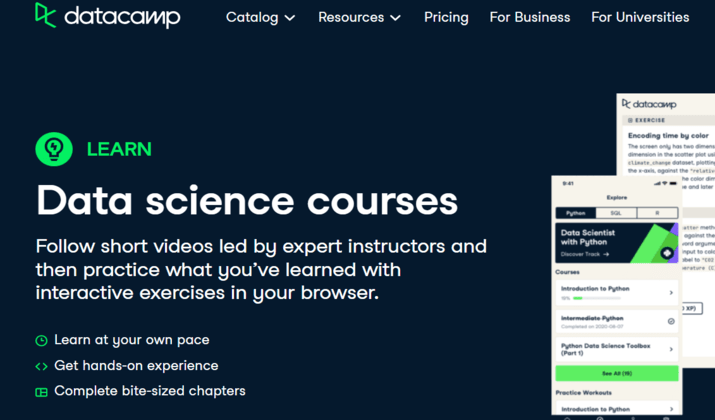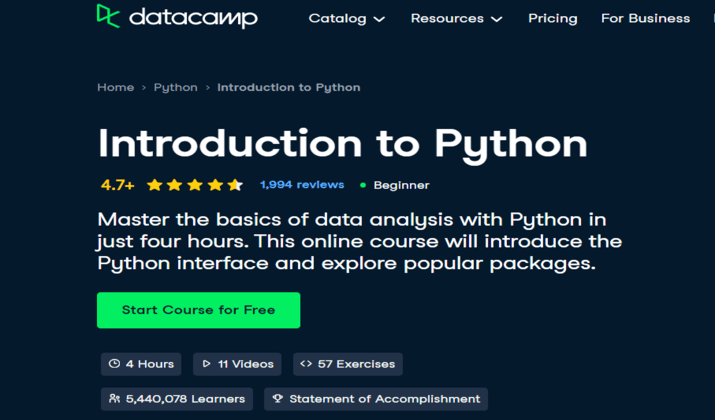Are you a curious individual with a passion for understanding the world through data? Have you heard about the power of data science and its ability to extract valuable insights from vast amounts of information?
Get Started with DataCamp for FREE.The place to learn R, Python & Data Science. Check Special Pricing.
Data Science is a field that combines statistics, programming, and domain expertise to make sense of complex data sets. If you want to be a part of this transformative industry, but you’re not sure where to start, stick around.
In this post, we will talk about DataCamp and the numerous benefits it offers to beginners and people aspiring to learn Data Science.
DataCamp is a popular online learning platform for data science and data engineering, offering self-paced courses in AI, data science, machine learning, and more.
It provides a structured approach to learning core programming skills essential for data analysis and data science.
DataCamp’s courses are hands-on and designed to be easy to follow, making it a valuable resource for beginners and professionals alike.
Let’s learn about DataCamp in detail, especially elaborating on things that you, as a beginner, want to know.
How Good is DataCamp for Beginners?

DataCamp is a valuable resource for beginners in data science and programming.
Get Started with DataCamp for FREE.The place to learn R, Python & Data Science. Check Special Pricing.
It offers a structured approach to learning core programming skills essential for data analysis, making it an excellent starting point for those new to the field.
DataCamp excels at teaching key fundamentals and provides learners with the tools needed to begin their data science journey effectively.
The platform’s hands-on courses, bite-sized lessons, and practical exercises help beginners grasp programming concepts and apply them in real-world scenarios, fostering a solid foundation in data science and programming.
While DataCamp is a great way for beginners to kickstart their learning, it’s important to note that to deepen knowledge in areas not covered extensively by DataCamp, such as computer science, mathematics, and machine learning algorithms, learners may need to supplement their education with additional resources.
What are the Prerequisites for Taking Courses on DataCamp?
The prerequisites for taking courses on DataCamp vary depending on the course level.
While some introductory courses may not require any prerequisites, most courses beyond the absolute beginner level have specific requirements to ensure students are adequately prepared.
Common prerequisites for DataCamp courses include basic R programming skills, basic statistical skills, and basic exploratory data analysis skills.
Also Read: DataCamp vs Simplilearn
Get Started with DataCamp for FREE.The place to learn R, Python & Data Science. Check Special Pricing.
What are Some Good Courses for Beginners on DataCamp?
Some good courses for beginners on DataCamp include:
- Understanding Data Science Course: This course is designed for those new to data science and does not require any prior coding experience. It covers the data science workflow, data collection, storage, data preparation, visualization, experimentation, prediction, and machine learning.
- Data Engineering Courses with Python: DataCamp offers data engineering courses that teach the skills needed to get started in data engineering. These courses provide a solid foundation for beginners looking to delve into data engineering using Python.
These courses are excellent starting points for beginners in data science and data engineering, providing a structured approach to learning essential concepts and skills in the field.
Does DataCamp Provide Certifications to Beginners?
Yes, DataCamp provides certifications to beginners as well as more experienced individuals.
DataCamp offers certifications for Data Analysts, Data Scientists, Data Engineers, and other roles, which are designed to measure proficiency across core competencies necessary for each role.
These certifications are developed with the help of data experts from various industries and are not directly tied to any specific course or track on DataCamp.
To earn a DataCamp certification, individuals need to pass timed exams and submit a case study based on scenarios relevant to the field they are seeking certification in.
Check Out: DataCamp vs Educative
Get Started with DataCamp for FREE.The place to learn R, Python & Data Science. Check Special Pricing.
What are the Career Prospects for Beginners Who Learn Data Science on DataCamp?
Beginners who learn data science on DataCamp can expect promising career prospects.
DataCamp provides a solid foundation in key data science concepts, programming languages like Python, R, and SQL, as well as practical skills related to programming, data cleaning, machine learning, probability and statistics, and data engineering.
While DataCamp equips learners with essential skills, it’s important to note that it may not provide all the theoretical knowledge needed for certain roles immediately.
However, by completing courses and certifications on DataCamp, beginners can enhance their employability, gain practical experience, and demonstrate their skills to potential employers.
Additionally, DataCamp’s career tracks and certifications can help beginners transition into roles such as data analysts, data scientists, machine learning engineers, and more, opening up opportunities in various industries that rely on data analysis and interpretation.
Also Read: DataCamp vs Platzi
What Career Fields beginners can Pursue after Completing Courses on DataCamp?
After completing courses on DataCamp, beginners can pursue various data science careers. Some examples of data science careers that beginners can consider include:
- Data Analyst: Data analysts focus on interpreting data, analyzing results, and providing insights to help businesses make informed decisions.
- Business Intelligence Analyst: Business intelligence analysts use data to help companies make strategic decisions by analyzing market trends and business performance.
- Data Engineer: Data engineers design and build data pipelines, databases, and systems to manage and process large volumes of data efficiently.
- Machine Learning Engineer: Machine learning engineers develop algorithms and models that enable machines to learn from and make predictions based on data.
- Data Scientist: Data scientists analyze complex data sets to identify trends, patterns, and insights that can drive business decisions and strategies.
These are just a few examples of the diverse data science careers that beginners can pursue after completing courses on DataCamp.
Each career path offers unique opportunities for growth and specialization within the field of data science.
Explore: DataCamp vs Bootcamp
How Beginners can Find Jobs after Learning from Datacamp?
By following these steps, beginners can increase their chances of finding job opportunities in the data science field after learning from DataCamp.
- Complete Relevant Courses: Start by completing courses on DataCamp that are aligned with the data science career you are interested in pursuing. Focus on building a strong foundation in programming languages like Python, R, and SQL, as well as key data science concepts and skills.
- Earn Certifications: Consider pursuing DataCamp certifications to validate your skills and knowledge in data science. These certifications can enhance your credibility and demonstrate your proficiency to potential employers.
- Build a Portfolio: Work on real-world projects and showcase them in a portfolio. Employers often look for practical experience, so having a portfolio that highlights your data science projects can set you apart in the job market.
- Networking: Connect with professionals in the data science field through networking events, online platforms like LinkedIn, and industry conferences. Networking can help you learn about job opportunities and get insights into the industry.
- Apply for Entry-Level Positions: Look for entry-level data science positions, such as data analyst, business intelligence analyst, or junior data scientist roles. Tailor your resume and cover letter to highlight the skills and knowledge you gained from DataCamp.
- Continuous Learning: Data science is a rapidly evolving field, so continue learning and staying updated on the latest trends and technologies in data science. Consider taking advanced courses on DataCamp to further enhance your skills.
Also Read: DataCamp Student Discounts
Conclusion
As you can see, DataCamp is an excellent resource for beginners looking to embark on their data science education. DataCamp offers a comprehensive roadmap that will guide you on your learning journey.
The platform equips you with the necessary skills to master data science. With hands-on exercises and real-world projects, you can gain practical experience and apply your knowledge in a meaningful way.
By choosing DataCamp, you are setting yourself up for remarkable success in the world of data science.
Not only will you learn from industry experts and gain access to a community of fellow learners, the doors to networking opportunities and collaborations will open for you.
Get yourself enrolled in one of the data science courses and begin your data journey with DataCamp today!













